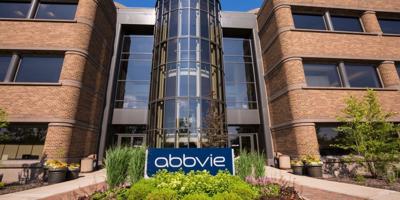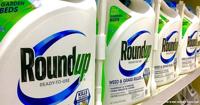
AbbVie headquarters
A federal judge has ended a class action accusing AbbVie of engaging in an alleged kickback scheme related to the popular arthritis drug Humira.
U.S. District Judge John Tharp issued an opinion July 10 granting summary judgment to the pharmaceutical company based in Chicago's north suburbs — along with former executives Richard Gonzalez and William Chase — ending claims they allegedly misled investors by concealing marketing programs that offered free administrative services to health care providers who agreed to prescribe Humira.
The class action would’ve included anyone who held AbbVie stock from October 2013 to September 2018. The complaint accused AbbVie of violating the federal Anti-Kickback Statute and claimed investors saw the value of their shares plummet when the scheme they alleged surfaced.
“Far from constituting unlawful kickbacks, however, AbbVie’s Humira-support programs
provided legitimate services that were integrally tied to the product itself,” Tharp wrote.
The initiatives in question started in 2012 and remain operational, Tharp said. One, called the Ambassador Program, hires registered nurses to visit homes and support required injection treatments through education and help with insurance and refill paperwork. The other, HLink, is an online service that lets providers obtain pre-clearance Humira authorization, determining which insurers cover the drug, what patients might pay out of pocket and if the insurer has pharmacy limitations.
A former nurse filed a whistleblower complaint in October 2015 in federal court in Chicago, alleging the free service was conditional on an agreement to prescribe Humira. A later complaint was filed in New Jersey, and then the California Department of Insurance investigated the programs. The shareholder complaint followed in late 2018.
“The plaintiffs fail to establish that AbbVie violated its ethics code by offering cash and gifts to curry favor with providers — the so-called ‘classic kickback theory,’” Tharp wrote.
The judge noted they had relied on the California Department of Insurance’s intervention in a state court lawsuit in September 2018 and on speculation that shareholders might be able to substantiate those allegations at their own trial.
“Hinting at extra-record materials not produced in discovery under the guise of providing an alternative channel for inadmissible hearsay is insufficient” to defeat a summary judgment motion, Tharp wrote. “The plaintiffs have not identified any evidence — financial documents, witness testimony or otherwise — indicating that AbbVie offered tangible goods to health care providers to induce prescriptions. That shortcoming is fatal, particularly given that the plaintiffs had ample time to identify such support during the six-year pendency of this case.”
Tharp further explained neither contested program meets the “remuneration” definition in the Anti-Kickback Statute. He pointed to the Department of Health and Human Services’ Office of Inspector General, which has issued “Compliance Program Guidance for Pharmaceutical Manufacturers” that stipulates, in part, “free items and services that are integrally related to the offering provider’s or supplier’s services … would have no independent value to the recipient apart from the services the donor provides, and therefore, would not implicate the antikickback statute.”
The plaintiffs had no evidence showing any provider reduced expenses or downsized because of the Ambassador program or HLink, Tharp said.
The judge said other courts have repeatedly agreed with the OIG’s distinctions broadly and specifically regarding the 2015 whistleblower complaint.
Tharp called the shareholders’ position “untenably broad” in that it would require banning any product feature that might save a prescriber time or money, even including hypothetical development of a Humira alternative that didn’t require injection or finding a way to reduce manufacturing expense, as those options could eliminate costs providers otherwise would’ve incurred.
“The better interpretation is more categorical: ‘Otherwise incurred’ envisions a scenario where the physician does not use the manufacturer’s product at all,” Tharp wrote. “Under that reading, a good or service carries ‘independent value’ only if it eliminates an expense that a physician would have incurred even had they never adopted the manufacturer’s product.”
The shareholders also alleged AbbVie executives didn’t properly discuss the programs while communicating with investors. But Tharp noted AbbVie generally and Chase directly did reference “very specific marketing programs” for Humira and weren’t obligated to disclose every detail about such efforts.
“If simply mentioning a sales driver were enough to trigger a duty to disclose every other contributing growth factor,” Tharp wrote, “then AbbVie (along with virtually every other public company) would be liable for an unending host of omissions.”
Had he found the programs to be impermissible kickbacks, Tharp said, the allegations of being misleading would hold weight. But by rejecting the fundamental premise, he found no meaningful exposure to corporate liability. And even if he did assume AbbVie made misleading statements, Tharp said the shareholders didn’t create a question of intent suitable for trial because “at a minimum” AbbVie and its executives had “a substantial good-faith basis to believe the Humira support programs were lawful, undermining any inference of deceptive intent.”
The shareholders claimed Gonzalez and Chase sold a suspicious amount of stock following the California investigation, but Tharp said the complaint’s evidence didn’t support the conclusion, such as there being five to seven months between the October 2016 investigation and any sales, the context of the sales volume related to each executive’s overall holdings and the net accumulation of shares during the class period.
Finally, Tharp noted that — despite an earlier assertion “no reasonable jury could find that AbbVie made misrepresentations based on the available evidence” — even if the shareholders could overcome that burden they still didn’t establish a record of financial injury.
The complaint said AbbVie stock value fell Sept. 18, 2018, the day the California Department of Insurance announced it would intervene. However, Tharp noted, the contested programs “were a matter of public record well before” that date, with each “prominently figured” on the company website during the class period, advertised to health care providers, discussed with insurers and the subject of independent reporting as well as being challenged in court.
“The extent of public awareness is fatal to the plaintiffs’ loss-causation theory,” Tharp wrote. “Preexisting public records provided an ample basis for an informed observer to familiarize themselves with both the Humira-support programs and the litigation surrounding their lawfulness prior to Sept. 18, 2018. That suggests, contrary to the plaintiffs’ argument, that AbbVie’s share value already reflected the public’s awareness of the Anti-Kickback allegations against AbbVie before (California) intervened.”
Tharp acknowledged the CDI’s action underscored the possibility of regulatory action, and a resulting influence on share prices, but said the totality of circumstances make it reasonable to conclude “mere publication of the CDI complaint altered share prices for reasons unrelated to any correction of a defendant’s prior misstatement.”
When the plaintiffs sought class certification, Tharp said, they alleged stock prices reflected the information available to the public. That means they can’t later contend the California action was the only thing affecting share value and not what had already been known.
Tharp also noted his decision didn’t rely on the admissibility of either side’s expert witnesses and denied motions relative to that testimony as moot.






